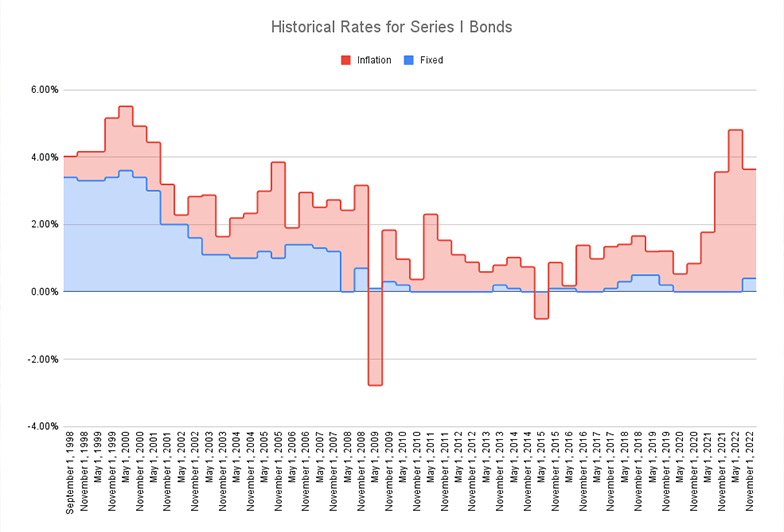Treasury Department Unveils 4.28% Series I Bond Rate for Next Six Months
The Treasury has announced the new interest rates for Series I bonds, prompting investors to reassess their options. In this Connect Invest blog post, we’ll critically examine the limitations of bond investments and explore the benefits of alternative investment options - specifically, real estate investments that offer higher returns and shorter terms.
An Introduction to Series I Savings Bonds
The Treasury Department has announced that Series I bonds purchased from May 1, 2024, to October 31, 2024, will offer an annual interest rate of 4.28%. This new rate reflects a decline in inflation, since bond rates are directly linked to inflation rates. The new annual interest rate is down from the previous 5.27% rate set in November 2023, and slightly below the 4.3% rate set in May 2023.
Current I bond holders will also see adjustments to their rates based on their original purchase dates, since rate changes occur every six months.
How Do Series I Bond Rates Work?
I bonds earn their name because their rates, which are adjusted every six months, are tied to inflation trends. Given the recent downward trend in inflation, investors were not surprised by the recent announcement of a lower interest rate compared to November.
These bonds consist of two components: a fixed interest rate and an inflation-adjusted or variable rate. Together, they form the composite or earnings rate. While the fixed base interest rate remains unchanged for the bond's lifetime, the inflation rate is revised every six months on May 1 and November 1. The Treasury Department uses the non-seasonally adjusted Consumer Price Index for Urban Consumers (CPI-U) for all items, including food and energy, to make these adjustments.
The variable rate stays constant for six months from the purchase date, regardless of new rate announcements. For example, if you buy an I bond in August, your variable rate will not change until February. At that time, the Treasury Department will apply the previous November's variable rate. The subsequent rate change will occur six months later.
How Do Series I Bonds Earn Interest?
Bonds earn interest for up to 30 years, roughly the same length as the average home mortgage. This interest accrues monthly and compounds semi-annually, meaning it's added to the bond's value every six months. Unlike Connect Invest Short Notes, which pay out interest dividends monthly, bond interest remains with the bond until you decide to cash out.
Investors can choose between electronic (digital) and paper I bonds. After 30 years, distributions from digital I bonds are deposited into the linked bank account. Paper bonds, on the other hand, must be physically presented for cash-out.
Bond investors don't have to wait for the 30-year maturity, they can cash out their bonds after 12 months. However, cashing out before five years incurs a penalty of three months' interest.
Source: TIME
More Competitive Investing Options Exist
The history of government bonds is long and rich. Introduced in 1935 under the Roosevelt administration by then-Treasury Secretary Henry Morgenthau Jr., bonds have been favored by investors for their stability and accessibility.
However, there are arguments against investing in Series I bonds. They cannot be cashed out in the first 12 months, and redeeming them within five years incurs a penalty of three months' interest. Additionally, earned interest is subject to federal income tax, and annual purchase limits are set per Social Security number or EIN. Moreover, bond investments often yield lower returns compared to other investment options.
The good news is that investing is no longer limited to the wealthy. Everyday investors can now build a diversified portfolio that goes beyond government bonds.
Real estate, historically considered a low-risk alternative investment, offers several advantages, including appreciation, potential cash flow from tenants, and permanence. The Connect Invest Short Notes model provides an opportunity for investors to include real estate in their portfolios without the burdens of direct ownership.
Connect Invest offers a selection of three Short Notes for investors to choose from - a six month note at 7.5% APY, a 12 month note at 8% APY, and a 24 month note at 9% APY. Investors fund our Short Notes, which Connect Invest then manages on behalf of investors. We work closely with hard money lender Ignite Funding in selecting the real estate projects our Short Notes help fund. The Connect Invest Short Note Portfolio, funded by investors, includes over 100+ real estate projects across the United States, including commercial and residential real estate spanning acquisition, development, and construction phases.
With yields significantly higher than Series I Bonds, Connect Invest Short Notes are an ideal way to diversify your portfolio and secure short-term stability. Our Short Notes allow you to benefit from new construction projects without the headache of extensive paperwork, the need for high capital, or the burden of project management. Simply select your Short Note, fund your initial investment, and enjoy hands-free cash flow, giving you the freedom to relax while collecting monthly passive income.
Connect Invest’s Short Notes, available to both accredited and non-accredited investors, are:
- Fund collateral-backed, first-position loans ONLY
- Offer terms of 6, 12, and 24 months, all providing investors with monthly interest dividends
- Diversify investor portfolios with active real estate projects
- Pay yields ranging from 7.5% - 9% APY
Unlike Series I bonds, Connect Invest Short Notes pay investors passive income through fixed-rate monthly interest payments, which begin the month after an initial investment has been made, which can be as low as $500. Once you select a Short Note, you are locked into your fixed rate - it won’t change throughout the duration of your active note.
Financial advisors have long recommended including real estate in a diversified investment portfolio. However, direct property ownership can be out of reach for the average person due to skyrocketing prices, high interest rates, and soaring mortgage costs. Connect Invest's Short Note program addresses this by making real estate investment accessible to everyday investors, empowering them to reap the benefits without the barriers of traditional property ownership.
Final Thoughts
While Series I bonds are a viable option for long-term investors who can hold money for years, Short Notes are easier, more accessible, and more lucrative investments for building wealth in the short term. The offer of fixed rates, monthly interest payments, and a portfolio backed by first-position loans make Short Notes a stable, low-risk investment.
To view Connect Invest’s current offerings and make your investment, click here.

